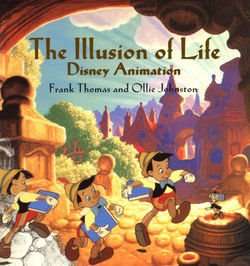The Illusion of Life: Disney Animation

The Illusion of Life: Disney Animation is a Non-Fiction instructional/historical book that was commissioned by Walt Disney himself prior to his death to be made by Les Clark, who was with Disney all the way from Oswald the Lucky Rabbit up to Walt's death, but when Les died, an attempt to complete the book was made in the 1980's in a large collaboration project with many surviving Golden Age and Dark Age Disney veterans, the project being spearheaded by two of Disney's Nine Old Men: Frank Thomas and Ollie Johnston.
The book has received universal acclaim and excellent sales, considered by many to be one of the best books on animation available. It has never been out of print since. It also recieved two companion books, Too Funny For Words and The Disney Villain.
Also the Trope Namer of The Twelve Principles of Animation.
Makes a great companion to The Animator's Survival Kit and Preston Blair Animation 1.
- Declarative Finger: Brought up in the book, as it was very commonly used by early animators who were still getting used to animating dialogue and thus having to time the accents of the characters actions to it. When the animators got better at finding ways to do this, the finger pointing was derided as cliche and faded out as a result.
- Doorstopper: Over 550 pages, it'll take you a long time to read through this thing.
- Fascinating Eyebrow: Walt Disney's thinking expression. Which coincidentially was pretty much his only expression during meetings.
- History of Animation: Goes into some detail about what was going on at Disney during their Golden Age and Dark Age.
- NSFW: Fred Moore's nude woman drawings.
- Pungeon Master: Ham Luske. The more unfunny was the pun, the more he laughed and the more annoyed were his coworkers...which made him laugh even harder.
- Shown Their Work: There's a reason this book is considered one of the best books on animation available.
- Spiritual Successors: Too Funny For Words and The Disney Villain.
- That Makes Me Feel Angry: It is discussed in the book that anyone who merely states their feelings is not acting.